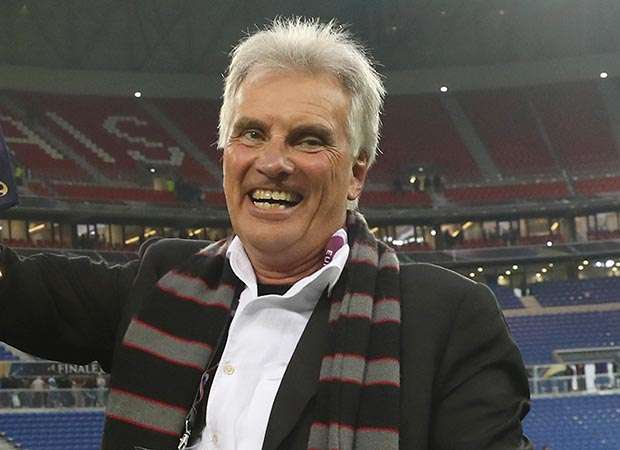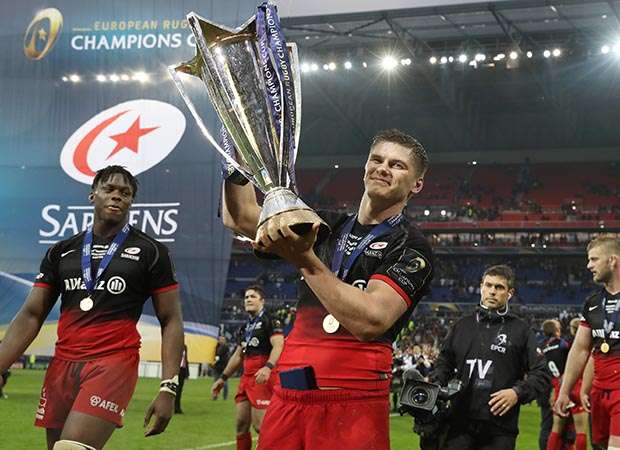When the new club-country accord between the RFU and the Premiership is announced on Monday, unless there is a cast-iron clause limiting the increase in international matches the potential for a serious rift will merely have been papered over.
This is especially the case with the potentially incendiary issue of matches being scheduled outside World Rugby/IRB’s designated international windows on a regular basis, with the England v Australia test at Twickenham on December 3 the latest instance.
While there is still understandable euphoria over England’s resurrection under Eddie Jones, and in particular the series clean-sweep in Australia this summer, it will be the fifth meeting between the two nations in just over a year.
However, two of the leading figures in the European game, Saracens owner Nigel Wray and EPCR chairman Simon Halliday, warned this week in exclusive interviews with The Rugby Paper that the danger of Anglo-Aussie fixture fatigue pales into insignificance set against the prospect of English clubs going into this season’s European Cup at a severe disadvantage. Defending champions Saracens are likely to be hardest hit by the international encroachment.
When Saracens play the opening pool game of their European Cup title defence on the weekend of December 10/11 against either Toulon, Sale, or the
Scarlets, they will have been without their seven-man England contingent for five weeks. To make matters worse they will go into the game with only a couple of days training available to re-assimilate their star players.
The same is true for the other English Premiership clubs who have qualified for the European Cup and have England internationals on their books. Based on the summer tour squad it means that Northampton (5), Wasps (4), Exeter (3), Leicester (3), and to a lesser extent, Sale, are all in a similar predicament. Nor will the scheduling enhance the prospects of Harlequins (6) or Bath (3) in the second tier European Challenge Cup.
No amount of “we’re all happy with the agreement” sticking-plaster can disguise the fact that in order to generate more income for the RFU – part of which will be allocated to the 12 Premiership clubs, with a share also due to to the cash-strapped Australian Rugby Union – the success of top tier English clubs has been put in jeopardy.
In the process the standing of Europe’s elite club tournament has been diminished. The lack of preparation represents a significant handicap to each club in a cut-throat tournament in which it is essential to make a good start if you are to have any chance of progressing to the quarter-finals.
There is a widely held belief that Saracens were helped in their quest to become the first English club to win the European Cup for nine years last season – with five English clubs making the last eight – because England were knocked out of their own World Cup disastrously early, giving the clubs time for proper preparation.
It appears to be more than a coincidence, and it highlights just how hobbled the Premiership contingent will be going into the first pool round of this season’s European Cup compared to their opponents in the French Top 14 and the Pro 12, with its Irish-Welsh-Scots-Italian mix.
All their national contingents will have returned to their clubs after the last international in the authorised autumn window on November 26, giving them virtually two weeks to train together before their crucial European Cup openers.
For the record, Northampton face Leinster, Montpellier and Castres; Leicester have French champions Racing 92,
Munster and Glasgow to contend with; Wasps have Toulouse, Pro12 champions Connacht, and Zebre in their pool; and Exeter must find a way past Clermont, Ulster, and Bordeaux-Begles.
Having just seen Saracens scale the heights by winning a European and domestic double after underwriting the club for two decades, Wray, below, told The Rugby Paper of his intense frustration at the handicap.
 “Our coaches are the experts I listen to, and they say that this is absurd. We’re going into a massive European game being penalised in our major tournament where the French, Irish and others are not. It’s wrong. It’s penalising the English clubs against the opposition.
“Our coaches are the experts I listen to, and they say that this is absurd. We’re going into a massive European game being penalised in our major tournament where the French, Irish and others are not. It’s wrong. It’s penalising the English clubs against the opposition.
“It’s part of the joint agreement between Premiership Rugby and the RFU, and both are to blame. It’s obviously totally unsatisfactory that our players won’t be with us until the Wednesday when we have a colossal game in Europe (three days later).”
Wray also commented on the ever-expanding international fixture list. “When I started backing club rugby 20 years ago there would be one autumn international, four games in the Five Nations, and maybe two summer tour internationals. Now there are 14 or 15 internationals a season instead of seven.”
The Saracens co-owner said: “It’s been so self-evident that if you want a strong England side you must have good club sides – it’s a mutual benefit. Yet, we were the only side last year to lose money in Europe, because while the tournament revenue is shared by 12 English clubs none of the others bear the costs of the squad bonuses and travel that we did.”
However, he agreed that he was not in rugby to improve his bank balance. “You are in sport to try to achieve something great, not because you want to make money. We get some money, yes, but often it is poorly organised.”
Wray revealed that under the new club-country agreement the funding for EQPs (England qualified players) has gone up, but said that last season Saracens had suffered for providing England with players.
“It irritated me that we lost £160,000 last season because we didn’t have sufficient England-qualified players in our squad for Premiership matches, purely because we were supplying seven or eight of our players to England!”
He added that other improvements have finally been made. “Now you also get some relief in the salary cap for the England players you supply. We are getting better, and common sense is becoming more common. However, I’m shocked at how long it’s taken the sport to go from amateur to professional.”
 Halliday, above, who was appointed to EPCR – who run the European Cup and the Challenge Cup – just over a year ago, shares Wray’s vexation at the failure of the national unions, and the game’s quasi governing body, World Rugby, to grasp the nettle over the biggest issues facing the pro game.
Halliday, above, who was appointed to EPCR – who run the European Cup and the Challenge Cup – just over a year ago, shares Wray’s vexation at the failure of the national unions, and the game’s quasi governing body, World Rugby, to grasp the nettle over the biggest issues facing the pro game.
Halliday is critical of the RFU/Premiership decision to play the last of the autumn internationals outside the November window, while leaving the first weekend in November fallow of international or Premiership matches:
“However valid their reasons for pushing into December, the reality is that it is detrimental to the European Cup.”
He adds, “And then at the end of the season we wonder why half of England’s Lions contingent are not available when the 2017 Lions play their first match in NZ.”
He says that important stakeholders like EPCR are being exempted from the professional game’s decision-making process, whether it is over fixture scheduling, player welfare, or disciplinary process.
“The European Cup is extremely important for our leagues, and the clubs that play in them, whether Pro12, Premiership or Top 14.
“I share the view that while international rugby is the showcase of the game, it does not make any sense that the clubs should be disadvantaged.
“Does it make sense that clubs like Saracens will only get their players back a few days before the start of the European Cup first round matches? It doesn’t. And the fact is that people talk about sensible shareholding, and then do absolutely nothing about it. Repeating that there aren’t enough weeks in the year gets very boring.”
Halliday says that the only solution is to get everybody around the table.
“The fact that we do not get invited to sit at the World Rugby table on fixtures, player welfare, or disciplinary matters is a disgrace – and it will come to a head.”
He focuses on the failings of the disciplinary process in particular. “It doesn’t help that we weren’t invited to talk about the disciplinary process, and yet there is no guidance from World Rugby about key disciplinary matters that we face.
“For example, there was controversy over Chris Ashton‘s citing last season (resulting in a ten-week suspension for making contact with the eye region of Ulster’s Luke Marshall in a European Cup match), and it ended his England Six Nations chances.”
Halliday reveals glaring inconsistencies in the citing system. “If a citing commissioner can end a player’s career, why aren’t we paying them when they have that level of accountability?
“While in some cases they’re paid, some are unpaid, and while some are at a match, others are not. We need guidance on citing commissioners, and it is crying out for co-operation between the senior stakeholders in the game.”
Halliday argues that the same applies to the deliberations about a global season. “The hard talking on the autumn and Six Nations windows hasn’t started yet – and that’s just in the Northern Hemisphere – while my understanding is that New Zealand are simply pushing on with their own plans.
“I expect EPCR will be involved in the end, but why we are not talking about crucial issues now God only knows.”
Halliday says that it should not take a ruinous game of brinkmanship between the national unions and the clubs before that happens.
He warns: “This is about who controls the assets, who pays their bills, and in the two biggest nations in the game, England and France, that is mainly the clubs, not the national unions.
“If it comes to a head – which nobody wants – then it could come down to, ‘you cannot have the players’. It is coming down the wire.”
Let’s hope the common sense Wray talks about prevails before that happens. In the interim, the likes of Saracens, Northampton, Wasps, Exeter and Leicester will be forced to make do and mend in Europe’s gold standard club tournament.























